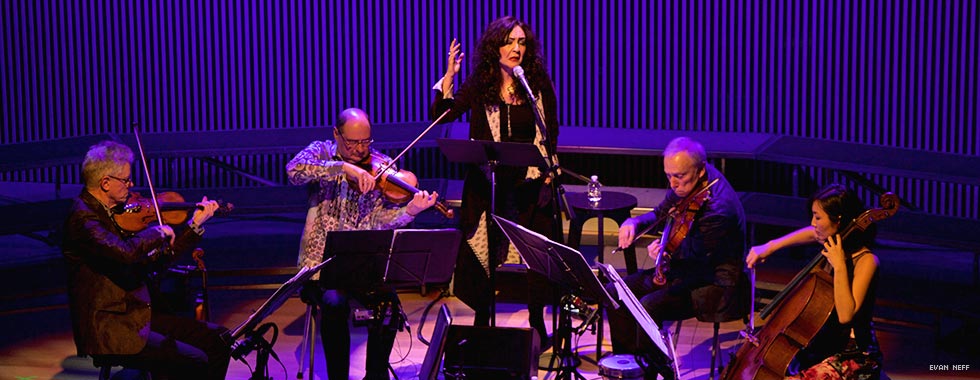

Kronos Quartet and Mahsa Vahdat: “Music for Change: The Banned Countries”
February 18, 2020 @ 7:30 pm - 10:00 pm
| $15 – $52Kronos Quartet
and Mahsa Vahdat
Music for Change: The Banned Countries
As a direct protest to the Executive Orders limiting travel to the United States by people from largely Muslim majority countries, Kronos Quartet will perform a program featuring music that highlights the rich diversity of artistic voices from Muslim-majority countries. The ensemble will be joined by Iranian vocalist Mahsa Vahdat for a special set of music from their recent collaboration album Placeless.
“As the most far-ranging ensemble geographically, nationally, and stylistically the world has known, the Kronos was easily within its comfort zone,” a Los Angeles Times reviewer writes about a Music for Change performance. “… This was a journey of discovery for which the audience couldn’t quite be prepared. One listened with wonderment.”
For forty-six years, San Francisco’s Kronos Quartet—David Harrington and John Sherba (violins), Hank Dutt (viola), and Sunny Yang (cello)—has combined a spirit of exploration with a commitment to continually reimagine the string quartet experience. In the process, Kronos has become one of the world’s most influential ensembles, performing thousands of concerts, releasing more than sixty recordings, collaborating with many of the most accomplished composers and performers, and commissioning more than 1,000 works and arrangements for string quartet.
Kronos appears at the most prestigious concert halls, clubs, and festivals. The ensemble is equally prolific and wide-ranging on recordings, including two Grammy-winning albums—Landfall with Laurie Anderson (2018) and Alban Berg’s Lyric Suite featuring Dawn Upshaw (2003). Other recent releases include Ladilikan with Trio Da Kali, an ensemble of Malian griot musicians assembled by Aga Khan Music Initiative, and Clouded Yellow by Bang on the Can founding composer Michael Gordon.
Vahdat, a native of Tehran, is a prominent performer of Persian vocal music and an advocate of freedom of expression. Her career has given a deeper knowledge about Iranian poetry and music to audiences across five continents. While her style is based on the Persian vocal traditions of classical and regional folk music, she sings with a contemporary expression. She composes most of her songs, typically using poems by classical writers such as Hafez and Rumi or contemporary ones like Fourogh Farokhzad and Mohammad Ibrahim Jafari.
After the concert, the musicians will engage in a discussion with audience members.






